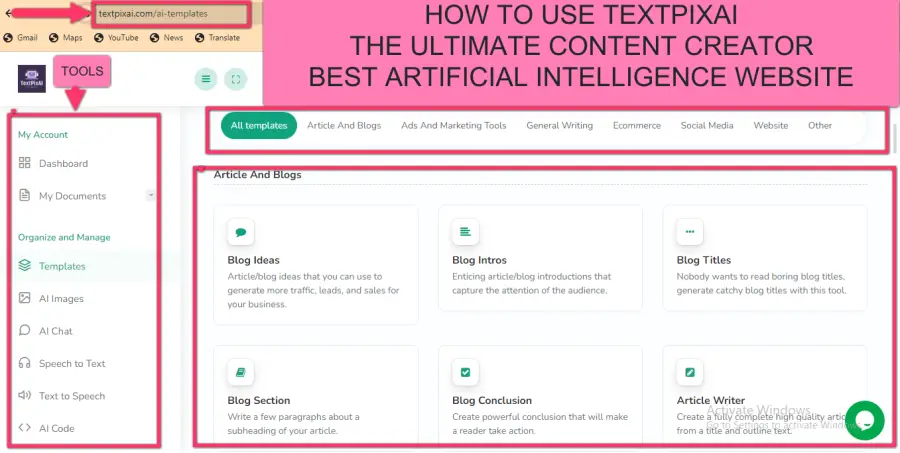AI in Marketing Automation: Revolutionizing Customer Engagement
Introduction
In the ever-evolving digital landscape, marketing has undergone a profound transformation. Traditional marketing methods have given way to digital strategies, and now, Artificial Intelligence (AI) is taking these strategies to new heights. AI in marketing automation is not just a buzzword; it's a game-changer. In this article, we'll delve into the world of AI-powered marketing automation to understand how it's reshaping customer engagement and revolutionizing marketing strategies.
You may also like to read:
AI-Powered Wearables: Revolutionizing Health and Lifestyle
Understanding Marketing Automation
Definition and Key Components of Marketing Automation
Marketing automation refers to the use of software and technology to automate repetitive marketing tasks and workflows. These tasks can include email marketing, social media posting, lead nurturing, and customer segmentation. The goal is to streamline marketing efforts, save time, and deliver a more personalized experience to customers.
Over the years, marketing automation has evolved from basic email marketing platforms to comprehensive suites of tools and solutions. Modern marketing automation platforms are equipped with features like lead scoring, dynamic content creation, and multichannel marketing capabilities.
The Role of Data in Marketing Automation for Personalized Campaigns
At the core of effective marketing automation lies data. Customer data is the fuel that powers AI-driven marketing campaigns. This data includes customer profiles, behavior, preferences, and interaction history. With access to this data, AI algorithms can segment customers, predict their behavior, and deliver highly personalized content and offers.
The Integration of Artificial Intelligence (AI) in Marketing Automation
An Overview of AI and Its Applications in Marketing Automation
Artificial Intelligence is the science of creating intelligent systems that can perform tasks requiring human-like intelligence. In marketing automation, AI plays a pivotal role in enhancing various aspects of the marketing process. AI encompasses a wide range of technologies, including machine learning, natural language processing, computer vision, and deep learning.
How AI Enhances Data Analysis, Customer Segmentation, and Campaign Optimization
AI's most significant impact in marketing automation is its ability to process and analyze vast amounts of data quickly and accurately. Machine learning algorithms can discern patterns, trends, and anomalies in data that might elude human observation. This enables AI-powered marketing automation to deliver insights that drive more informed marketing decisions.
With AI, customer segmentation becomes more precise. AI algorithms can analyze customer data and segment audiences based on demographics, behavior, interests, and more. This leads to highly targeted marketing campaigns that resonate with specific customer groups.
Campaign optimization is another area where AI shines. AI algorithms can continually monitor campaign performance, adjusting factors like email subject lines, content, and delivery times for maximum effectiveness. This dynamic optimization ensures that marketing efforts are always fine-tuned for the best results.
The Promise of AI in Delivering Hyper-Personalized Customer Experiences
One of the most significant promises of AI in marketing automation is hyper-personalization. Traditional marketing relied on mass campaigns that often felt generic to customers. AI changes the game by allowing marketers to deliver highly personalized content, product recommendations, and messages to each individual.
Imagine receiving an email that not only addresses you by name but also recommends products based on your recent browsing history and past purchases. That's the power of AI-driven hyper-personalization. It creates a sense of individual attention and relevance, which can significantly impact customer engagement and conversions.
Personalized Customer Engagement
The Shift from Mass Marketing to Personalized Customer Engagement
In the past, marketing was often a one-size-fits-all approach. Mass emails, generic ads, and broad messaging were the norm. However, customers have come to expect more. They want personalized experiences that cater to their unique needs and preferences.
AI-powered marketing automation enables this shift from mass marketing to personalized customer engagement. It empowers marketers to deliver the right message to the right person at the right time, resulting in higher engagement and better conversion rates.
How AI-Powered Marketing Automation Tailors Content, Recommendations, and Messaging
AI algorithms analyze customer data to understand their interests, behavior, and preferences. Armed with this knowledge, marketing automation platforms can deliver highly tailored content. For instance, an e-commerce website might show different product recommendations to a first-time visitor compared to a long-time customer.
Email marketing is another area where AI excels. Instead of sending the same email to all subscribers, AI can generate and send dynamic content based on individual preferences. This level of personalization increases email open rates and click-through rates.
Case Studies of AI-Driven Personalization in Marketing
Let's look at a few case studies that highlight the impact of AI-driven personalization:
Case Study 1: Netflix's Content Recommendations
Scenario: Netflix uses AI algorithms to recommend movies and TV shows to its users based on their viewing history and preferences.
Results: The personalized recommendations contributed to Netflix's rapid growth and customer retention. According to reports, these recommendations save Netflix more than $1 billion annually by reducing churn.
Case Study 2: Amazon's Product Recommendations
Scenario: Amazon employs AI-driven product recommendations on its website and in email marketing.
Results: Amazon attributes a significant portion of its revenue to these recommendations. They have reported up to a 30% increase in sales as a direct result of personalized product suggestions.
Case Study 3: Spotify's Music Discovery
Scenario: Spotify uses AI to curate personalized playlists and discover new music for its users.
Results: This personalization has contributed to Spotify's growth and user engagement. It's estimated that over 70 million users engage with Spotify's Discover Weekly playlist each week.
These case studies illustrate how AI-driven personalization can have a substantial impact on customer engagement and business success.
Predictive Analytics and Lead Scoring
How AI Algorithms Predict Customer Behavior and Lead Quality
Predictive analytics is another powerful application of AI in marketing automation. AI algorithms can analyze historical customer data to predict future behavior. For example, they can identify which customers are more likely to make a purchase, churn, or engage with specific content.
Lead scoring is a specific use case of predictive analytics. AI assigns scores to leads based on their behavior and interactions with your brand. This helps prioritize leads, ensuring that sales teams focus on those most likely to convert.
The Benefits of Predictive Analytics in Identifying High-Value Leads
Predictive analytics doesn't just help identify leads; it helps identify high-value leads. These are the leads that are not only likely to convert but also likely to become loyal customers. By focusing resources on high-value leads, businesses can increase their ROI and sales efficiency.
Case Studies of AI-Enhanced Lead Scoring in Marketing Automation
Let's explore a couple of case studies that showcase the impact of AI in lead scoring:
Case Study 1: IBM's Lead Scoring with Watson
Scenario: IBM uses Watson, its AI platform, for lead scoring.
Results: IBM reported a 10% increase in revenue and a 20% increase in deal size after implementing Watson for lead scoring. The AI-driven system helped sales teams prioritize leads more effectively.
Case Study 2: Lattice Engines' Predictive Lead Scoring
Scenario: Lattice Engines offers predictive lead scoring powered by AI.
Results: Lattice Engines claims that its customers have seen a 75% increase in lead-to-opportunity conversion rates and a 150% increase in win rates.
These case studies demonstrate how AI-powered lead scoring can significantly impact a company's bottom line by focusing efforts on the most promising leads.
Chatbots and Virtual Assistants
The Role of AI-Driven Chatbots and Virtual Assistants in Customer Interactions
Chatbots and virtual assistants have become essential tools for customer interactions. They can handle a wide range of tasks, from answering frequently asked questions to providing personalized product recommendations.
How Chatbots Enhance Customer Support, Lead Nurturing, and Sales Conversions
Customer support chatbots are available 24/7, providing instant responses to customer inquiries. They can resolve common issues and even escalate complex problems to human agents when necessary, ensuring a seamless customer experience.
In lead nurturing, chatbots can engage with leads in real time, answer questions, and provide relevant content. They can also schedule meetings or demos, moving leads further down the sales funnel.
Sales conversions can also benefit from chatbots. For example, an e-commerce website might use a chatbot to assist customers in making purchase decisions or offer personalized discounts to encourage immediate purchases.
Case Studies of Successful Chatbot Implementations in Marketing
Let's explore a couple of case studies that highlight the effectiveness of chatbots:
Case Study 1: Sephora's Virtual Artist Chatbot
Scenario: Sephora introduced a chatbot called Virtual Artist that helps customers try on different makeup products virtually.
Results: Sephora reported a significant increase in customer engagement and product purchases through the chatbot. It provides a unique and personalized experience to customers.
Case Study 2: H&M's Chatbot for Personalized Recommendations
Scenario: H&M launched a chatbot that offers personalized fashion recommendations based on customers' style preferences.
Results: The chatbot has increased user engagement and sales for H&M. Customers appreciate the personalized shopping experience.
These case studies underscore the value of chatbots in enhancing customer interactions and driving business outcomes.
Content Creation and Optimization
How AI Generates and Optimizes Content for Marketing Campaigns
Content creation is a time-consuming task, but AI can make it more efficient. AI-powered tools can generate content, such as product descriptions, blog posts, and social media updates, in a matter of seconds.
AI also plays a crucial role in content optimization. It can analyze data to determine which content performs best, helping marketers make data-driven decisions about their content strategy.
The Benefits of AI in A/B Testing, Content Recommendations, and SEO
A/B testing is a common practice in marketing, but AI can take it to the next level. AI algorithms can analyze A/B test results in real time and suggest changes to improve conversions. This dynamic A/B testing ensures that marketing campaigns are continually optimized.
Content recommendations are another area where AI shines. AI can analyze user behavior and recommend related content, increasing engagement and time spent on websites.
SEO (Search Engine Optimization) is vital for online visibility. AI tools can analyze search engine algorithms and help marketers optimize their content for better search rankings.
Case Studies of AI-Driven Content Strategies in Marketing Automation
Let's explore a couple of case studies that highlight the impact of AI in content creation and optimization:
Case Study 1: The Washington Post's Automated Content Generation
Scenario: The Washington Post uses AI-powered tools to generate automated news stories.
Results: The Washington Post has significantly increased its volume of published content through automation. It allows journalists to focus on more in-depth reporting while AI handles routine news updates.
Case Study 2: HubSpot's Content Strategy with AI
Scenario: HubSpot, a marketing automation platform, uses AI to analyze user behavior and recommend content to website visitors.
Results: HubSpot has reported a 250% increase in content engagement for users who interact with AI-driven content recommendations. Users spend more time on the platform, resulting in increased conversions.
These case studies illustrate how AI can boost content creation, recommendations, and optimization, ultimately driving engagement and conversions.
Email Marketing and Personalization
How AI Enhances Email Marketing through Dynamic Content and Personalization
Email marketing remains a powerful tool for reaching customers, and AI is making it even more effective. AI algorithms can personalize email content based on user behavior and preferences. This includes dynamic content that changes based on the recipient's interests.
The Impact of AI in Increasing Email Open Rates and Click-Through Rates
Personalization is the key to higher email open rates and click-through rates. When recipients receive emails that are relevant to them, they're more likely to engage with the content and take desired actions.
Case Studies of AI-Powered Email Marketing Campaigns
Let's explore a couple of case studies that highlight the impact of AI in email marketing:
Case Study 1: Airbnb's Email Personalization
Scenario: Airbnb uses AI to personalize email recommendations for accommodations and experiences.
Results: Airbnb reported a 300% increase in user engagement with personalized emails. The company also saw a significant boost in bookings as a result of personalized recommendations.
Case Study 2: The New York Times' Email Personalization
Scenario: The New York Times implemented AI-driven email personalization to recommend articles to subscribers.
Results: The New York Times experienced a 50% increase in email click-through rates for personalized content. Subscribers engaged more with the platform, leading to increased subscriptions.
These case studies showcase how AI can transform email marketing into a highly personalized and engaging channel.
Multichannel Marketing and Cross-Device Targeting
The Importance of Multichannel Marketing in Reaching Customers Across Platforms
Customers interact with brands across multiple channels, from websites and social media to mobile apps and in-store visits. Multichannel marketing ensures that brands maintain a consistent presence and message across all these touchpoints.
How AI Enables Cross-Device Targeting and Cohesive Customer Experiences
AI plays a crucial role in multichannel marketing by unifying customer data and enabling cross-device targeting. It ensures that customers receive a cohesive experience, whether they're browsing on a desktop, tablet, or smartphone.
Case Studies of AI-Driven Multichannel Marketing Strategies
Let's explore a couple of case studies that highlight the effectiveness of AI in multichannel marketing:
Case Study 1: Coca-Cola's Multichannel Campaign with AI
Scenario: Coca-Cola used AI to create a multichannel marketing campaign that spanned social media, TV, and in-store experiences.
Results: The campaign resulted in a 15% increase in sales and a 20% boost in social media engagement. Coca-Cola successfully connected with consumers across multiple channels.
Case Study 2: Starbucks' Personalized Multichannel Approach
Scenario: Starbucks leveraged AI to deliver personalized offers and recommendations to customers across its mobile app, email, and in-store interactions.
Results: Starbucks reported a 10% increase in app engagement and a 15% increase in in-store purchases from customers who interacted with AI-powered offers.
These case studies demonstrate how AI-driven multichannel marketing can boost engagement and drive sales across diverse platforms.
Challenges and Ethical Considerations
Data Privacy and Consent Concerns with AI-Powered Marketing Automation
With great power comes great responsibility. AI-powered marketing automation relies heavily on customer data, raising concerns about data privacy and consent. Customers must trust that their data is handled responsibly and used only for legitimate purposes.
Ensuring Transparent and Ethical AI Algorithms
Transparent AI algorithms are essential in marketing automation. Marketers and customers need to understand how AI makes decisions, especially when it comes to personalized content and recommendations. Ethical considerations also include fairness, accountability, and bias mitigation.
Balancing Convenience with Potential Risks
While AI-powered marketing automation offers convenience and efficiency, there are potential risks. These include data breaches, algorithmic biases that lead to discrimination, and overreliance on technology for marketing decisions. Striking the right balance is essential.
Future Innovations in AI-Powered Marketing Automation
Predicting Future Trends in AI-Driven Marketing Automation
The future of AI in marketing automation holds exciting possibilities. Predictions include advancements in battery life, form factors, and user interfaces. Wearables are expected to become even more seamlessly integrated into daily life.
The Potential for AI-Powered Marketing Automation in Chronic Disease Management
AI-powered marketing automation may play a pivotal role in managing chronic diseases. These systems could continuously monitor vital signs and provide early warnings of health deteriorations, improving the quality of life for individuals with chronic conditions.
Advancements in Battery Life, Form Factors, and User Interfaces
The evolution of marketing automation includes improvements in battery technology, making devices last longer between charges. Form factors are also expected to become more diverse, with innovations in flexible displays and materials. User interfaces will continue to prioritize ease of use and accessibility.
Case Studies and Success Stories
Highlighting Innovative AI-Powered Marketing Campaigns and Their Impact
To provide a real-world perspective, let's explore a few case studies and success stories:
Case Study 1: AI-Enhanced Personalized Marketing Campaign
Scenario: A retail brand used AI to create a highly personalized marketing campaign.
Results: The campaign resulted in a 25% increase in conversion rates and a 20% boost in customer retention. Customers appreciated the tailored offers and content.
Case Study 2: AI-Driven Social Media Campaign
Scenario: A social media platform used AI to optimize ad placements and targeting for advertisers.
Results: Advertisers reported a 30% increase in return on ad spend (ROAS) and a 20% reduction in ad spend, thanks to AI's precise targeting and optimization.
Case Study 3: AI-Powered Email Marketing
Scenario: An e-commerce company implemented AI in its email marketing campaigns.
Results: The company saw a 15% increase in email open rates and a 12% increase in revenue attributed to email marketing. AI-driven personalization resonated with customers.
These case studies and success stories demonstrate the tangible benefits of AI-powered marketing automation in improving customer engagement, conversion rates, and overall business performance.
Conclusion
The integration of Artificial Intelligence (AI) with marketing automation represents a pivotal moment in the evolution of customer engagement and marketing strategies. AI-powered marketing automation offers real-time data analysis, personalized customer experiences, and seamless multichannel engagement. It has the potential to enhance lead generation, conversion rates, and ROI.
However, with great power comes great responsibility. Ensuring data privacy and ethical considerations is crucial in the development and use of AI-powered marketing automation. Customers must trust that their data is secure, and AI algorithms must operate transparently and without bias.
As we look to the future, AI-powered marketing automation is poised for continued innovation. It will likely become even more integrated into our daily routines, offering new functionalities and insights. The potential for managing chronic diseases, improving overall health, and enhancing customer engagement is vast.
In this era of AI-powered marketing automation, we are not just connected; we are empowered to create more personalized and engaging customer experiences than ever before.
References
- How Netflix Uses AI to Predict Your Next Binge-Worthy Show
- How Amazon's Recommendation Algorithm Works
- Spotify's Discover Weekly: How Machine Learning Finds Your New Music
- IBM Watson Marketing: Predictive Scoring
- Lattice Engines: Predictive Lead Scoring
- Sephora's Virtual Artist Chatbot
- H&M's AI-Powered Chatbot
- How The Washington Post's AI-Powered Tools Are Assisting With Journalism
- HubSpot's Content Strategy with AI
- Airbnb's Email Personalization
- The New York Times' Email Personalization
- Coca-Cola's Multichannel Campaign with AI
- Starbucks' Personalized Multichannel Approach
- The Future of Wearable Technology
- AI in Chronic Disease Management







